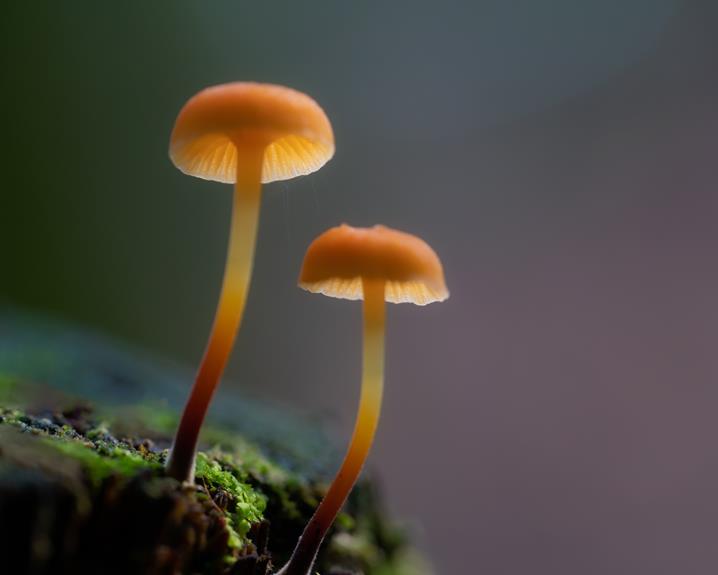Curious about which animals have a taste for mushrooms? Look no further! In this article, you’ll explore the fascinating world of mushroom-eating creatures.
From rabbits to raccoons, squirrels to monkeys, and even deer, you’ll discover a diverse range of species that enjoy indulging in these fungal delicacies.
We’ll delve into the reasons behind each animal’s affinity for mushrooms, exploring their nutritional benefits and the risks involved.
With vivid pictures accompanying each example, get a visual insight into the world of mushroom consumption in the animal kingdom.
List of animals that eat mushrooms
Here’s a list of animals that eat mushrooms:
- Squirrels: Many species of squirrels, including eastern gray squirrels and fox squirrels, love to feed on mushrooms, especially in the fall.
- Deer: White-tailed deer, mule deer, and other species of deer have been known to eat various types of mushrooms, including morels and chanterelles.
- Rabbits: Rabbits, especially cottontail rabbits, will eat various types of mushrooms, including oyster mushrooms and puffballs.
- Pigs: Feral pigs and wild boars will eat mushrooms, including truffles, as they root around in the forest floor.
- Bears: Black bears, grizzly bears, and Asiatic black bears have been known to eat mushrooms, including honey mushrooms and chanterelles.
- Chipmunks: These small rodents love to collect and store mushrooms, especially in the fall, to eat during the winter.
- Mice: Various species of mice, including deer mice and white-footed mice, will eat mushrooms, including oyster mushrooms and morels.
- Slugs and Snails: Some species of slugs and snails, like the garden snail, will eat mushrooms, including fungi like oyster mushrooms.
- Insects: Many insects, such as bees, wasps, ants, and beetles, will eat mushrooms or use them as a food source.
- Frogs and Toads: Some species of frogs and toads, like the American green treefrog, will eat mushrooms, including fungi like oyster mushrooms.
Key Takeaways
- Rabbits primarily eat grass and vegetation, but may consume mushrooms when starving, although mushrooms pose a significant risk due to toxicity.
- Squirrels love to eat mushrooms and consider them a source of nutrients, as their digestive system is adapted to eating wild fruits and nuts, but they can tolerate a certain level of toxicity in mushrooms.
- Monkeys, particularly the Goeldi’s Monkey, consume fungi in the wild, with mushrooms making up a significant portion of their diet in some cases.
- Raccoons are omnivores that will eat almost anything, but consuming poisonous mushrooms is not advisable as many mushrooms contain toxins that can be deadly for them.
Rabbits and Mushrooms
When it comes to rabbits and mushrooms, it’s important to remember that while they primarily eat grass and vegetation, they occasionally consume mushrooms when they’re starving. However, rabbits rarely eat mushrooms in the wild as they pose a significant risk due to their toxicity. Many mushrooms are toxic to rabbits, and ingesting them can be fatal. Therefore, it isn’t a smart choice for rabbits to consume mushrooms.
On the other hand, squirrels have a different relationship with mushrooms. Squirrels love to eat mushrooms and consider them a source of nutrients. Their digestive system is adapted to eating a variety of wild fruits and nuts, including mushrooms. Interestingly, squirrels can tolerate a certain level of toxicity in mushrooms without getting sick. They rarely experience any adverse effects from consuming mushrooms.
It is important to note that while rabbits occasionally eat mushrooms when they’re starving, it isn’t a common behavior for them. The risk of mushroom toxicity outweighs any potential benefits. Therefore, it’s advisable to keep mushrooms away from rabbits’ diet and focus on providing them with a balanced meal of grass and vegetation.
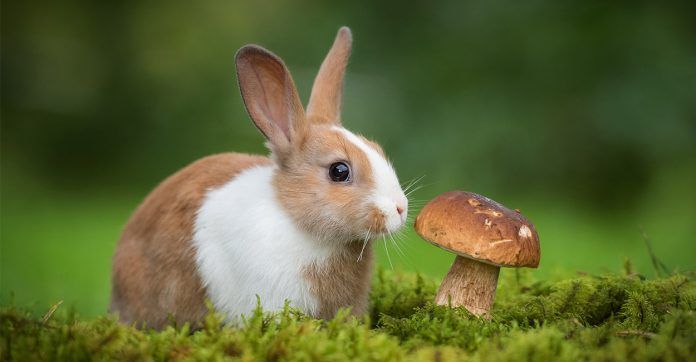
Monkeys and Mushrooms
Now let’s turn our attention to monkeys and their relationship with fungi.
Some species of primates have been observed consuming fungi in the wild, although mushrooms make up less than 5% of their overall diet.
However, the Goeldi’s Monkey is an exception, as mushrooms make up more than 60% of its diet.
This raises interesting questions about monkey mushroom preferences, the benefits of fungi in their diet, and the potential role of mushrooms in primate nutrition.
Monkey Mushroom Preferences
How do monkeys prefer their mushrooms? Let’s take a closer look at monkey mushroom preferences.
- Limited consumption: Monkeys spend less than 5% of their feeding time on mushrooms. They aren’t known for their love of mushrooms and their mushroom consumption habits are relatively rare among primates.
- Goeldis Monkey exception: The Goeldis Monkey stands out with mushrooms making up more than 60% of its diet. This primate species has a unique preference for fungi and relies heavily on mushrooms for sustenance.
- Varied diet: While monkeys may not prioritize mushrooms in their diet, they still consume a diverse range of other foods. Fruits, leaves, insects, and nuts are more commonly found in their foraging repertoire. Mushrooms play a minor role in their overall feeding habits.
Role in Primate Diet
Here is the impact of mushroom consumption on primate health:
- Nutritional Benefits: Mushrooms provide essential nutrients like protein, carbohydrates, vitamins, and minerals, which are important for primate health and well-being.
- Digestive Adaptations: Primate digestive systems have evolved to process a variety of foods, including mushrooms. They’ve the enzymes necessary to break down the complex compounds found in fungi.
- Potential Risks: Although some mushrooms are safe for primates to consume, there are also toxic species that can be harmful or even fatal. Primate species must be cautious when selecting which mushrooms to eat.
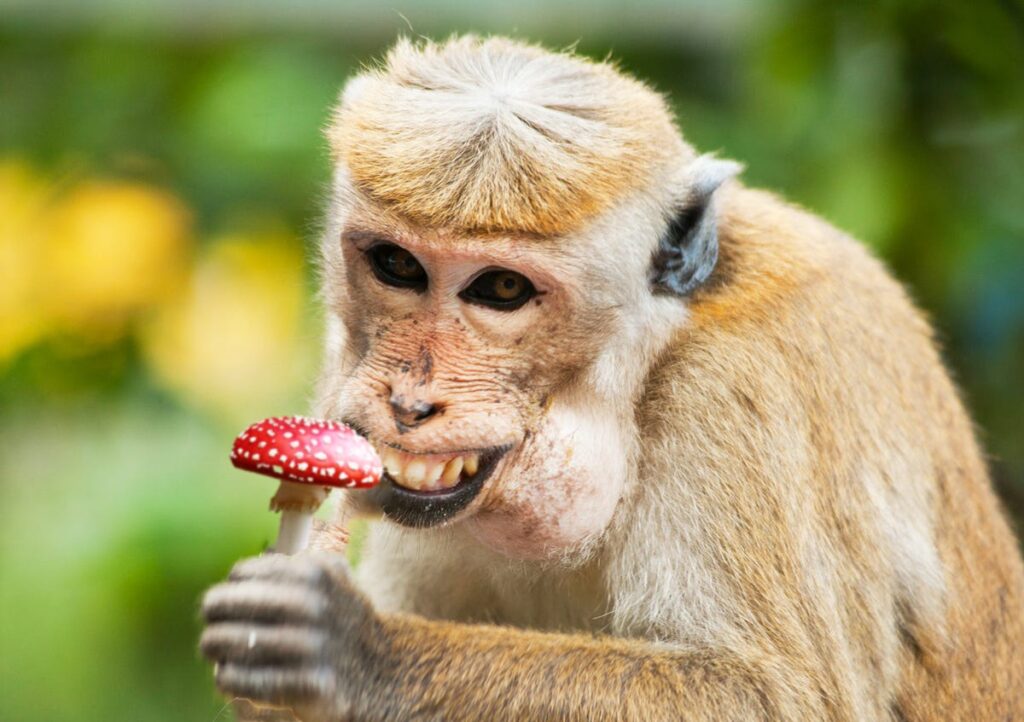
Raccoons and Mushroom Consumption
Raccoons do eat mushrooms, and they’re actually quite fond of them. In fact, raccoons are known to be opportunistic omnivores, which means they’ll eat just about anything they can find, including fruits, insects, nuts, and yes, even mushrooms.
Raccoons have a keen sense of smell, which helps them sniff out food sources, including mushrooms. They’re particularly attracted to mushrooms that grow in wooded areas, like oyster mushrooms, chanterelles, and even poisonous ones like the death cap mushroom (although they might not know the difference!).
It’s not uncommon to see raccoons digging around in leaf litter or under trees, searching for buried treasures like mushrooms. They use their dexterous hands to uncover and grasp the mushrooms, and then devour them with gusto.
Interestingly, raccoons might even help spread mushroom spores through their droppings, which can aid in the dispersal of fungal species. This process is called “endozoochory,” and it’s a clever way that raccoons contribute to the ecosystem.
So, there you have it! Raccoons and mushrooms – an unlikely yet intriguing friendship.
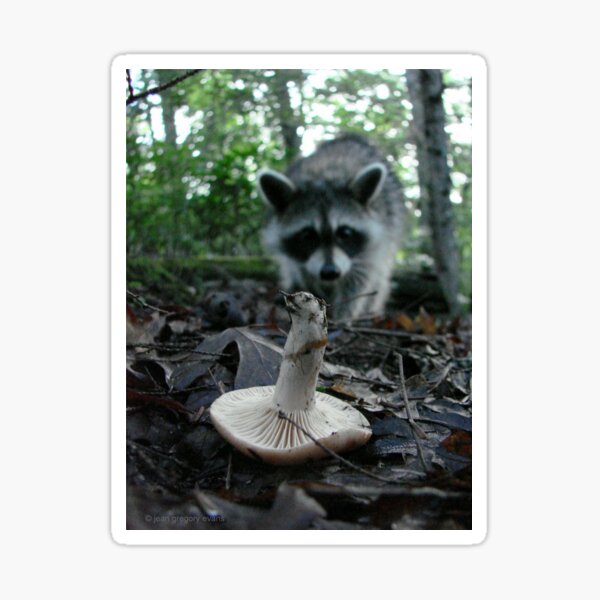
Squirrels’ Love for Mushrooms
When it comes to animals that eat mushrooms, squirrels are particularly known for their love of fungi. These small, agile creatures have a diverse diet that includes a variety of nuts, fruits, and seeds. However, mushrooms hold a special place in a squirrel’s heart.
Here are three reasons why squirrels are so fond of mushrooms:
- Nutritional Value: Mushrooms provide squirrels with a rich source of essential nutrients. They’re packed with vitamins, minerals, and antioxidants that contribute to their overall health and well-being. Squirrels have adapted digestive systems that enable them to extract the maximum nutritional value from mushrooms, allowing them to thrive on this diverse food source.
- Mushroom Diversity: Squirrels have a keen sense of smell and can easily detect the different types of mushrooms available in their surroundings. With over 10,000 known species of mushrooms, squirrels have a wide range of options to choose from. This diversity ensures that squirrels can find mushrooms that suit their taste preferences and provide them with the necessary nutrients they need.
- Tolerance to Toxicity: While some mushrooms can be toxic to humans and other animals, squirrels have developed a certain level of tolerance to mushroom toxicity. Their digestive system is adapted to handle small amounts of toxins found in certain mushrooms without suffering any ill effects. This allows squirrels to enjoy a mushroom feast without the risk of getting sick.
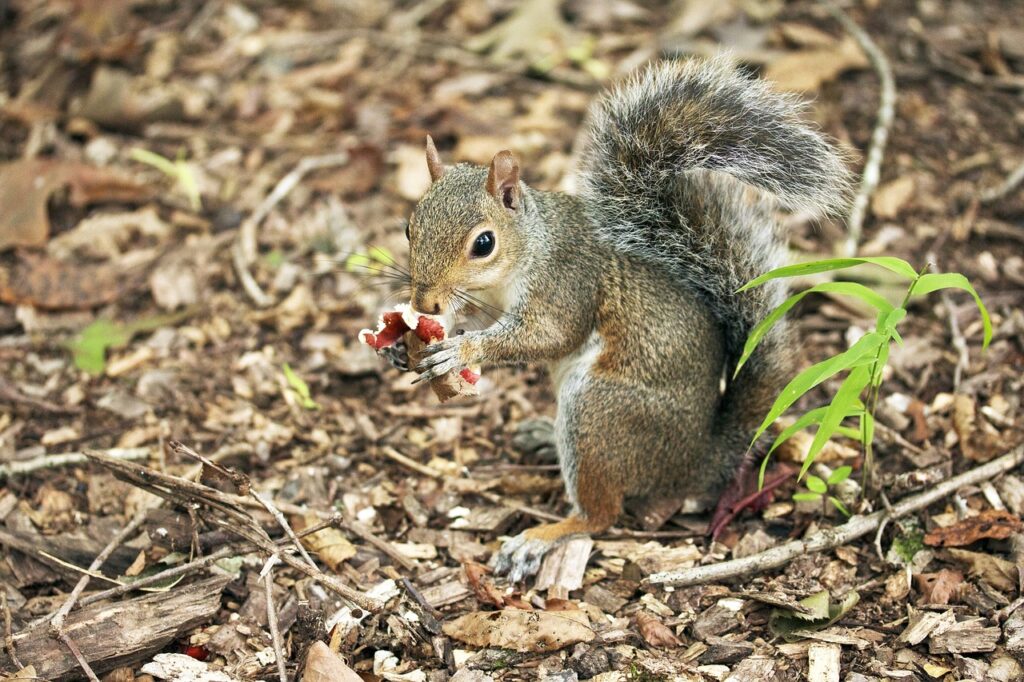
Deer’s Fondness for Mushrooms
Deer enthusiastically include mushrooms in their diet, especially during periods of grass scarcity. While mushrooms aren’t a staple food for deer, they’re a favorite treat that provides additional nutrients. Unlike humans, deer can tolerate mushrooms that are toxic to us. This is because deer have evolved to efficiently metabolize and eliminate compounds that may be harmful to other animals. However, it’s important to note that not all mushrooms are safe for deer consumption. Some mushrooms can still be toxic to deer, so it’s essential for them to choose their fungi carefully.
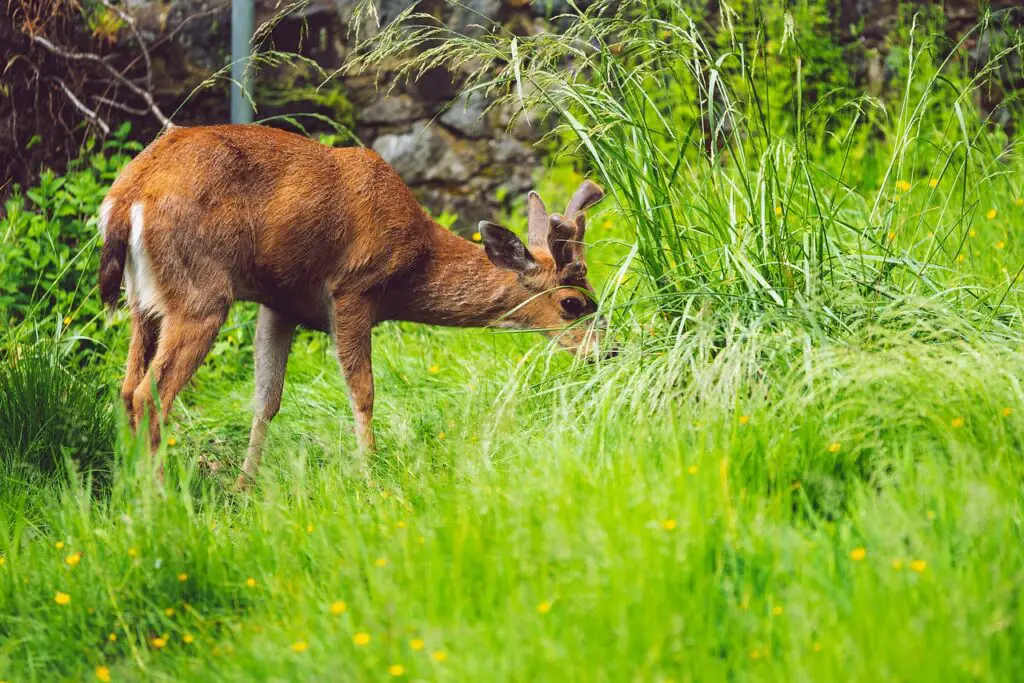
Tolerance of Toxic Mushrooms
When it comes to the tolerance of toxic mushrooms, animals have varying levels of resistance.
Some animals, like rabbits, rarely eat mushrooms in the wild due to the risk of toxicity, as ingesting poisonous mushrooms can be fatal for them.
On the other hand, animals like squirrels and deer have developed a certain level of tolerance to toxic mushrooms, as their digestive systems are adapted to eating a variety of wild foods.
Understanding the tolerance of toxic mushrooms in different animal species is important for their overall health and survival.
Nutritional Value of Mushrooms
Mushrooms provide a significant source of nutrition for various animals. They’re rich in vitamins, minerals, and antioxidants, making them a valuable addition to an animal’s diet. For example, mushrooms are a great source of B vitamins, such as riboflavin, niacin, and pantothenic acid, which play a crucial role in energy metabolism and maintaining healthy skin and coat. Additionally, mushrooms contain essential minerals like potassium, phosphorus, and selenium, which are necessary for proper muscle function, bone health, and immune system support.
However, it’s important to note that while mushrooms offer numerous benefits, there are also potential risks associated with their consumption. Many mushrooms are toxic to animals, and ingesting them can lead to severe illness or even death. Animals must be cautious when foraging for mushrooms, as some toxic varieties closely resemble edible ones. It’s advisable for animals to rely on their instincts and avoid consuming mushrooms altogether, unless they possess the necessary knowledge to differentiate between safe and poisonous species.
Risks of Eating Mushrooms and Adaptations
Be cautious of the dangers associated with mushroom consumption. While mushrooms are a source of nutrients for many animals, they also pose risks of mushroom toxicity.
Here are three important points to consider:
- Toxicity: Mushrooms can contain harmful substances that are poisonous to animals, including humans. Some mushrooms have toxins that can cause severe illness or even death if consumed. It’s crucial to accurately identify edible mushrooms before consuming them to avoid the risk of toxicity.
- Variability: The level of toxicity in mushrooms can vary greatly. Even mushrooms that are generally safe for consumption may contain higher levels of toxins depending on factors like their growing conditions or stage of growth. Therefore, it’s essential to exercise caution and be aware of potential risks when eating wild mushrooms.
- Individual Sensitivity: Different animals have varying levels of tolerance to mushroom toxicity. While some species, like squirrels and deer, can tolerate certain levels of toxicity, other animals, such as rabbits and raccoons, are more susceptible to the harmful effects of toxic mushrooms. It’s crucial to understand the specific risks associated with mushroom consumption for each animal species.
Many animals have evolved mechanisms to tolerate the toxicity of mushrooms, which contain various toxic compounds like alkaloids, glycosides, and polyketides.
Here are some examples of how animals have adapted to cope with mushroom toxicity:
- Detoxification pathways: Some animals, like the wood mouse (Apodemus sylvaticus), have developed efficient detoxification pathways to break down toxic compounds found in mushrooms. Enzymes like cytochrome P450 can metabolize toxins, making them less harmful to the animal.
- Specialized gut microbiome: The gut microbiome of some animals, such as the fruit fly (Drosophila melanogaster), contains microbes that can degrade toxic compounds found in mushrooms. This symbiotic relationship helps the animal tolerate mushroom toxins.
- Toxin-binding proteins: Certain animals, like the hedgehog (Erinaceus europaeus), have proteins in their liver that can bind to toxic compounds, rendering them harmless. These proteins, called “toxin-binding proteins,” can neutralize the toxins, allowing the animal to safely consume mushrooms.
- Behavioral adaptations: Some animals have developed behavioral adaptations to minimize the risk of mushroom toxicity. For example, the European rabbit (Oryctolagus cuniculus) is cautious when feeding on mushrooms, selecting only certain species and avoiding others that are known to be toxic.
- Evolutionary adaptations: Over time, some animals have evolved specific physiological adaptations to counteract the toxic effects of mushrooms. For example, the monarch butterfly (Danaus plexippus) has a unique physiology that allows it to sequester toxins from the milkweed plant, which is toxic to most animals. Similarly, some animals may have evolved specific enzymes or mechanisms to neutralize mushroom toxins.
- Dietary specialization: Some animals have specialized diets that include mushrooms, and they have developed specific adaptations to cope with the toxins. For example, the fungus-feeding beetle (Bolitotherus cornutus) has a specialized gut that allows it to break down and utilize the nutrients from fungi, including toxic species.
These animals have evolved unique mechanisms to cope with the toxicity of mushrooms, allowing them to exploit this food source and thrive in their environments.
y not always be able to distinguish between edible and poisonous species. Humans should exercise caution when foraging for wild mushrooms to avoid mistakenly eating poisonous species.
Frequently Asked Questions
Are There Any Health Risks for Rabbits if They Eat Mushrooms?
Eating mushrooms can pose health risks for rabbits. Many mushrooms are toxic, and ingesting them can be fatal. It’s important to note that mushrooms offer little nutritional value for rabbits.
Do Monkeys Consume Mushrooms as a Significant Part of Their Diet in the Wild?
Monkeys consume mushrooms as part of their diet in the wild, but it is not a significant portion. The impact of mushroom consumption on monkey behavior is minimal, as they spend less than 5% of their feeding time on mushrooms.
Can Raccoons Tolerate the Toxicity of Mushrooms?
Raccoons can tolerate the toxicity of mushrooms, but it’s not a smart choice for them to consume. Mushroom consumption by rabbits is risky as many are toxic, and ingesting them can be fatal.
How Do Squirrels Adapt to Eating Mushrooms?
Squirrels adapt to eating mushrooms through foraging techniques and consumption adaptations. They have developed a digestive system that can tolerate a certain level of toxicity, allowing them to safely consume mushrooms as a nutrient-rich food source.
Are Mushrooms a Preferred Food Source for Deer During Certain Seasons?
During certain seasons, mushrooms are a preferred food source for deer. They enjoy eating mushrooms, especially when grass is scarce. Deer can tolerate mushrooms that are toxic to humans and find them nutritious.

Erzsebet Frey (Eli Frey) is an ecologist and online entrepreneur with a Master of Science in Ecology from the University of Belgrade. Originally from Serbia, she has lived in Sri Lanka since 2017. Eli has worked internationally in countries like Oman, Brazil, Germany, and Sri Lanka. In 2018, she expanded into SEO and blogging, completing courses from UC Davis and Edinburgh. Eli has founded multiple websites focused on biology, ecology, environmental science, sustainable and simple living, and outdoor activities. She enjoys creating nature and simple living videos on YouTube and participates in speleology, diving, and hiking.

